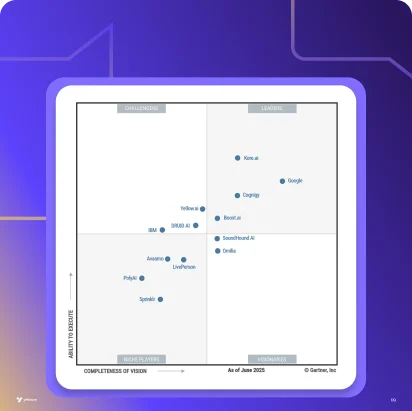In a rush and need the TL/DR version?
Summarize
Contact center software is vital for businesses striving to enhance customer service and satisfaction. This blog explores the leading contact center software solutions for 2024, including Yellow.ai, Nextiva, Genesys Cloud CX and many more, which are transforming how businesses communicate with customers. These platforms enable companies to seamlessly manage customer interactions across multiple channels and deliver personalized service efficiently.
Key Features and benefits of contact center software
- Comprehensive omnichannel support: Integrates various communication channels like phone, email, and social media into one platform for consistent customer service.
- Advanced analytics and reporting: Offers detailed insights into customer interactions and service efficiency, enabling data-driven decision-making.
- Automation and AI: Artificial intelligence is employed to streamline operations and improve customer interaction quality, reducing the workload of human agents.
- Enhanced security and data protection: Ensures customer data is secure and compliant with global standards, which is crucial for maintaining trust and legal compliance.
- Flexible deployment options: Supports cloud-based, on-premise, and hybrid deployment models to suit business needs and compliance requirements.
- Scalability and integration: Easily scales to handle increased customer volume and integrates with existing business systems for enhanced functionality.
Yellow.ai stands out with its advanced AI-driven capabilities that optimize agent performance and customer satisfaction. Its robust platform manages multiple communication channels and provides actionable insights and real-time data, making it indispensable for businesses aiming to excel in a competitive digital marketplace.
Note: This summary is not a substitute for reading the article in full, as you may miss out on important nuances.
The contact center software market is expanding rapidly due to its multitude of advantages. Customers contact businesses with inquiries daily, and each inquiry presents a possibility for your business to grow. If you want to streamline operations and increase customer experience, engagement and satisfaction, use the right contact center software. As an enterprise dealing with digital-first customers, you must cater to them through an omnichannel presence and connect with them through their preferred communication medium beyond traditional calls. From 2023–2030, analysts predict that the worldwide contact center software market will expand at a CAGR of 23.9%.
Upscale your business and customer service with advanced analytical and data-driven insights, decision-making, and evaluating your customers’ sentiments, speech and tones using the boons of artificial intelligence, ML, IoT and the latest innovations. Bringing all these elements as a one-stop-solution, which is easy to use and integrate, contact center software emerges and empowers businesses like yours.
In this comprehensive guide, you will have answers to five ‘W’ and one ‘H’. Learn: What is contact center software? When should you use it? The perks will convince you Why you must invest in it, apart from giving you a gist of Who the potential beneficiaries are? You will have explanations of Which enterprises must employ? Its key features will guide you on How to select the most suitable one.
What is contact center software?
Contact center software is a comprehensive solution designed to manage and optimize customer conversations and interactions across multiple communication channels. Contact center platforms integrate various modes of communication, such as voice, SMS, social media, email, chat, and video. This integration enables agents to handle multiple customer support requests from a single application, streamlining operations and enhancing service quality.
Contact center software provides significant benefits for businesses of all sizes and industries. Small businesses can use it to offer professional, responsive customer service without needing a large team. Medium and large enterprises can efficiently scale their customer support operations, maintaining high service standards as they grow. Industries like retail, healthcare, finance, and telecommunications benefit from the software’s ability to provide consistent, personalized support, improving customer satisfaction and loyalty.
The growing demand for contact center software is fueled by businesses’ need to meet rising customer expectations for quick, efficient, and multi-channel support.
For example:
A logistics and delivery company uses a contact center platform to manage customer inquiries about package tracking, delivery times, and service issues through phone, chat, and social media. This ensures that customers get timely updates and resolutions, enhancing trust and satisfaction. The platform’s real-time analytics can help the company identify and resolve common issues more efficiently.
10 Benefits of using the best contact center software
Contact center software offers an array of benefits that considerably enhance customer service and operational efficiency. These benefits are from the POVs of the enterprise, the human agents and the end-user, i.e., the customers. The perks include improved customer satisfaction, better workforce management, and cost savings, making it a valuable investment for businesses of all sizes.
Here are ten significant benefits of using an effective contact center platform:
10 Benefits of using the best contact center platform
- Enhanced customer satisfaction
- Increased customer recommendations
- Reduced customer churn
- Better labor management
- Lower Average Handle Time (AHT)
- Reduced facilities costs
- Advanced analytics and reporting
- Lower agent attrition
- Increased agent referrals
- Automation and self-service
Customers’ POV
1. Enhanced customer satisfaction
Contact center software enables personalized and efficient service, increasing customer satisfaction and loyalty. Customers feel connected and are attended to 24/7 on their preferred support channels with prompt and accurate resolutions.
2. Increased customer recommendations
Satisfied customers are prone to recommend your business, boosting your reputation and driving new sales through word-of-mouth referrals.
3. Reduced customer churn
The best contact center software helps retain customers and reduce churn rates by providing consistent and exceptional service.
Enterprise’s POV
4. Better labor management
Advanced workforce management tools forecast interaction volumes and optimize schedules, reducing overstaffing and improving labor efficiency.
5. Lower Average Handle Time (AHT)
Efficient call routing and pre-call data collection reduce agents’ time on each interaction, improving productivity and customer satisfaction. With a suitable contact center software in place, you can dramatically lower the AHT.
6. Reduced facilities costs
Contact center platforms support remote work, reducing the necessity of investing for physical office space and related expenses.
7. Advanced analytics and reporting
Real-time and historical data analysis helps optimize performance, identify, track and monitor trends, and make informed decisions to improve customer service.
Agent’s POV
8. Lower agent attrition
Providing agents with advanced tools and a supportive environment increases job satisfaction and reduces turnover.
9. Increased agent referrals
Happy agents are more likely to refer potential hires, reducing recruitment costs and improving team quality.
10. Automation and self-service
Features like IVRs and chatbots automate routine tasks, enabling customers to resolve issues independently and reducing the load on live agents.
Call center vs. contact center: Understanding the differences
Call center and contact center are often referred interchangeably, but there are many differences. Stay clear between contact center and call center. The former is more advanced than the latter as it integrates multi-channel support. This enables enterprises to meet customers on their preferred platforms. The table below will help you understand the distinct differences between the two.
| Feature | Call center | Contact center |
| Communication channels | Primarily handles phone calls | Manages multiple communication channels including phone, SMS, email, social media, live chat, and video. |
| Customer interactions | Focuses on voice interactions only | Provides a unified interface for handling multichannel customer inquiries |
| Technology integration | Limited to call management systems. | Integrates advanced technologies like CRM, AI, and chatbots for a comprehensive customer service experience. |
| Flexibility | Typically based in a fixed office location. | Supports office-based, remote, and hybrid work environments, offering greater flexibility. |
| Data analytics | Basic call logs and metrics | Advanced analytics and reporting tools for real-time and historical data analysis, aiding in forecasting and planning. |
| Customer experience | Provides basic support with limited personalization. | Enhanced customer experience with personalized interactions and omnichannel support. |
| Scalability | Needs significant infrastructure for expansion. | Easily scalable with cloud contact center platforms, allowing businesses to grow without major additional investments. |
By harnessing contact center software’s advanced capabilities and offerings, businesses can provide superior customer experiences through multiple channels, improve operational efficiency, and gain valuable insights through comprehensive data analytics. Such advantages make contact centers a more versatile and robust solution compared to traditional call centers, especially for today’s digital-savvy customers with soaring expectations.
Best 12 contact center software platform in 2024
Best 12 contact center software platform in 2024
- Yellow.ai
- Nextiva
- Genesys Cloud CX
- Dialpad AI Contact Center
- Nice (CXone)
- Five9 Intelligent Cloud Contact Center
- CloudTalk
- Talkdesk
- Vonage Contact Center
- 8×8 Contact Center
- RingCentral Contact Center
- Avaya Experience Platform
Yellow.ai
Yellow.ai’s Contact Center Platform revolutionizes modern customer service by providing a seamless omnichannel experience, while significantly boosting agent productivity.It integrates various communication channels like phone, email, live chat, social media, text messaging, voice, and retains context ensuring a unified conversation.
Customers can switch between channels effortlessly without repeating themselves, and agents have real-time access to the entire interaction history. This cohesive approach not only enhances efficiency and personalization but also significantly boosts customer retention rates, meeting the high expectations of today’s tech-savvy consumers. With Yellow.ai, businesses can experience:
- 50% increase in agent’s productivity
- 2X increase in tickets handled
- 60% reduction in operational cost
Let’s look at some of the unique features of this contact center software.
- Powered by generative AI our models are trained on billions of conversations leading to high intent accuracy. Users can switch across 135+ languages.Generative AI-powered features like chat summarizer, tone change, reply suggestion, etc. to increase agent productivity.
- Integrate your CRM and ticketing system with Inbox for effective query resolutions, while leveraging our customer data platform (CDP) for real-time user insights.
- Seamlessly integrate your CRM and ticketing system with Inbox for efficient query resolutions and leverage our CDP for real-time user insights.
- Optimize agent operations with AI-first automation solutions for ticket assignment, SLAs, triggers and notifications.
- Gain valuable insights into agent efficiency and productivity with our monitoring dashboards, detailed analytics widgets, and comprehensive reporting tools.
Nextiva
Nextiva, as a contact center software, integrates smoothly with its unified communications platform. With options for inbound, outbound, and blended contact center operations, it excels in robust CRM integrations, including Salesforce, Microsoft Dynamics, HubSpot, and Zendesk. The NextivaONE app allows seamless calling, messaging, and document retrieval, giving agents a comprehensive view. New features like a built-in AI assistant, dynamic scripting, and native process automation enhance efficiency, making it a strong contender for businesses seeking to improve their customer service capabilities.
Key features:
- AI assistant for enhanced efficiency
- Dynamic scripting to guide agents
- Automation of processes natively
- Proactive notifications for customers
- Omnichannel routing for integrated interactions
Genesys Cloud CX
Genesys Cloud CX is designed for large enterprises and complex contact centers requiring advanced features and customizations. It is ideal for businesses looking for on-premises and hybrid deployments, catering to industries with stringent compliance regulations like finance. Known for its scalability, Genesys supports large-scale operations. The platform offers omnichannel support, advanced self-service features like chatbots and voicebots, and seamless integrations with enterprise-level applications, making it ideal for complex, large-scale deployments.
Key features:
- Omnichannel communication support
- Advanced self-service features
- Seamless enterprise application integrations
- Scalable for large deployments
- Compliance with stringent regulations
Dialpad AI Contact Center
Dialpad AI Contact Center, as the name suggests, leverages AI to boost customer service and operational performance. It provides real-time coaching insights and next-generation analytics, making it ideal for data-driven businesses. Dialpad’s AI-driven features include call sentiment analysis, real-time text transcription, and contextual agent prompts, enabling agents to serve customers more effectively. The platform also offers smart call monitoring and call queues, focusing on optimizing sales team performance.
Key features:
- Next-generation analytics
- AI-powered real-time transcription
- Contextual agent prompts
- Smart call monitoring and call queues
- Custom call routing options
Nice (CXone)
Nice (CXone) enhances customer interactions and operational efficiency through AI and automation. It supports omnichannel routing, workforce optimization, and AI-driven analytics, providing comprehensive tools for large enterprises. Recent innovations like Enlighten Copilot and Enlighten Autopilot offer automated assistance for agents, helping them with tasks and giving feedback. This platform also includes professional services, business consulting, and training, making it suitable for complex deployments and enterprise implementations.
Key features:
- Omnichannel routing support
- Workforce optimization tools
- AI-driven analytics and insights
- Automated agent assistance
- Professional services and consulting
Five9 Intelligent Cloud Contact Center
Five9 Intelligent Cloud Contact Center is an AI-powered solution suitable for the scalability of large enterprises. It leverages AI to automate routine tasks, enabling agents to focus on value-added activities. One can generate detailed reports and provide sentiment analysis on customer interactions. Thus, it comes in handy for data-driven organizations. Its seamless integration with various cloud telephony solutions allows businesses to retain existing hardware and software while benefiting from its robust features.
Key features:
- Agent assist
- Workflow automation
- Conversational IVR
- Call recording and transcription
- Workforce management
CloudTalk
CloudTalk betters phone support efficiency through high-quality call and CRM software integration. It leverages AI-powered routing and call prioritization to manage high call volumes effectively. As a cloud-based platform, CloudTalk offers scalable and flexible solutions, free from the limitations of on-premises systems. It includes customizable call queue messages and toll-free numbers. CloudTalk’s AI conversational intelligence module automates repetitive tasks, allowing agents to focus on complex customer needs. However, it lacks some omnichannel support.
Key features:
- AI-powered routing and prioritization
- High-quality CRM integration
- Customizable call queue messages
- Toll-free numbers
- Workforce optimization tools
Talkdesk
Talkdesk is a cloud-based contact center software used by enterprises to enhance customer engagement through automation and AI. It supports multichannel communication, including email, web chat, SMS, and social media, allowing for personalized workflows and interactions. It is easy to implement; Talkdesk includes agent dashboards, call forwarding, call queuing, predictive dialing, IVR, and CRM integrations. The customizable platform is suitable for larger businesses with complex routing and multichannel needs.
Key features:
- Multichannel communication support
- AI-powered real-time analytics
- Extensive CRM integration
- Advanced call management features
- Highly customizable workflows and routing
Vonage Contact Center
Vonage Contact Center integrates with CRM and business applications, streamlining workflows and enhancing agent productivity. It offers omnichannel capabilities, handling customer interactions across various channels like voice, email, chat, and social media. Its advanced analytics and reporting tools give insights into call center performance, agent productivity, and customer satisfaction. Vonage Contact Center uses artificial intelligence to automate tasks, improve call routing, and provide real-time assistance to agents. The software can scale to meet changing business needs, allowing for easy expansion or contraction of agent capacity. However, some users have expressed concerns about pricing and scalability.
Key features:
- Call routing and continuity
- Call flip
- CRM integration
- Consistently high call quality and uptime
- Video collaboration
8×8 Contact Center
8×8 Contact Center integrates voice, video, chat, and enterprise API solutions into a unified cloud communications platform. It supports omnichannel routing and offers advanced features such as workforce engagement management and speech and text analytics. This platform helps to improve customer interactions and streamline business operations. 8×8’s integration capabilities with various CRMs and its competitive pricing make it an attractive option for mid-market and large enterprises with global calling needs. However, it is a tad difficult to set up.
Key features:
- Global calling coverage
- Workforce engagement management
- Speech and text analytics
- Quality management tools
- Co-browsing capabilities
RingCentral Contact Center
RingCentral Contact Center improves customer service through advanced communication tools and AI-driven insights. It supports multiple channels, including email, web chat, SMS, and social media, ensuring seamless customer interactions. Fundamental characteristics like whisper coaching, call routing, and IVR improve agent efficiency and service quality. The platform’s generative AI technology, RingSense, automates customer follow-ups, scores calls based on sentiment, and tracks keywords, providing valuable conversation intelligence. RingCentral’s strong network interconnects make it ideal for multi-location businesses using an SD-WAN backbone.
Key features:
- Whisper coaching and call routing
- IVR for efficient call management
- AI-driven conversation intelligence
- Seamless network integration
Avaya Experience Platform
Avaya Experience Platform provides omnichannel support across on-premises, cloud SaaS, and hybrid models. Each implementation includes advanced reporting and analytics, CRM integration, and traditional call center features. Avaya’s contact center solutions empower employees to respond faster and with greater insight, enhancing customer engagement and satisfaction. While Avaya has a long history in telecom solutions, it is relatively new to the cloud contact center market, which can be a disadvantage.
Key features
- Omnichannel communication integration
- Advanced reporting and analytics
- CRM integration for seamless data access
- Real-time data and metrics
- Automated workflows and routing
Types of contact centers
Contact center solutions can be deployed in various formats, each catering to specific business needs and operational requirements. Understanding these types helps organizations choose the best fit for their customer service strategy. Here are four primary types of contact centers:
1. Cloud-based contact center
A cloud-based contact center leverages a public cloud managed by a third-party vendor, allowing agents to access the software from any location. This setup eliminates the need for significant infrastructure investments and ongoing maintenance costs.
For instance: A retail company swiftly sets up a cloud contact center to manage peak season inquiries without worrying about hardware scalability and IT overheads.
2. On-premise contact center
An on-premise contact center is built and managed within an organization’s infrastructure. It offers high reliability, superior call quality, and enhanced security. This setup requires significant upfront investment in hardware and software.
For example: A loan lending institution chooses an on-premise contact center to ensure maximum data security and control over customer interactions.
3. Multichannel contact center
Several organizations have shifted from traditional telephones to social media, SMS, email, and online web chats, necessitating the development of a multichannel contact center. This type of center processes customer requests through multiple channels but may only integrate with a few outlets. It often makes it difficult to preserve communication history, potentially causing agents to repeat previously answered questions, creating communication gaps and resulting in a less-than-ideal customer experience.
For example: A healthcare provider uses a multichannel contact center to manage patient appointments and inquiries via phone and email. However, it may need help with integrating SMS and social media communications.
4. Omnichannel contact center
An omnichannel contact center provides a unified interface for managing customer interactions across all channels, ensuring a seamless and personalized customer experience. This type of contact center allows agents to view the entire history of customer interactions, regardless of the communication method.
For instance: An e-commerce company can use an omnichannel contact center to provide consistent support across phone, chat, social media, and email, ensuring customers receive personalized service at every touchpoint.
12 Key features to consider in contact center software
Contact center software encompasses many features designed to enhance customer interactions, improve agent efficiency, and provide valuable insights into operations.
Here are 12 key features to consider when evaluating the best contact center software:
- Comprehensive omnichannel support
- Optimized Automatic Call Distribution (ACD)
- Automation of routine tasks
- Advanced call recording and monitoring
- In-depth analytics and reporting
- Efficient IVR
- AI-powered chatbots and voice agents
- Advanced speech and text analytics
- User-friendly interface
- AI-powered capabilities
- Seamless CRM Integration
- Security and data protection
1. Comprehensive omnichannel support
It integrates all communication channels—voice, email, chat, social media—into a single platform, providing agents with a holistic view of customer interactions. It ensures seamless and consistent service across all channels, enhancing the customer experience.
2. Optimized Automatic Call Distribution (ACD)
It automatically routes calls to the appropriate agents based on predefined criteria like skill level, customer status, and call type. This enhances call handling efficiency and ensures customers are connected to the best available agent.
3. Automation of routine tasks
Contact center software must automate repetitive tasks such as follow-ups and data entry, letting agents focus on more complex customer inquiries. Robotic process automation (RPA) is an example of it. Automation boosts efficiency and minimizes the risk of human error, improving overall service quality.
4. Advanced call recording and monitoring
This feature is essential for quality assurance, training, and compliance. Advanced features like interaction monitoring provide a real-time understanding of customer satisfaction and agent performance, facilitating continuous improvement.
5. In-depth analytics and reporting
Tracks real-time and historical data, providing insights into call volume, average handle time, first call resolution, and more. These metrics help inform business decisions and improve its performance, where it is lagging.
6. Efficient IVR
The contact center platform must arm you with interactive voice response (IVR). It guides customers through self-service options and efficiently routes calls based on voice or keypad inputs, reducing the need for live agents for simple inquiries.
7. AI-powered chatbots and voice agents
Modern chatbots can do tasks and interpret requests, unlike the annoying automated menus of the past. Conversational AI chatbots and virtual assistants can comprehend and answer queries, address minor consumer concerns, and qualify leads 24/7 using natural language to respond.
8. Advanced speech and text analytics
Analyze speech and text interactions to provide insights into customer sentiment, trends, and compliance issues. This data helps tailor coaching, scheduling, and forecasting to improve customer experience and engagement.
9. User-friendly interface
A user-friendly interface is critical for effective agent training and everyday operations. Intuitive software minimizes the learning curve for agents, allowing them to deliver faster and more effective service.
10. AI-powered capabilities
Leverage artificial intelligence to investigate customer data, predict behaviors, and offer insights. This helps personalize customer interactions and anticipate customer needs. Likewise, depending on the tool, sentiment analysis listens to the customer’s tone or identifies mood-indicating words like “This is frustrating” or “You’ve been a great help”. It reads those indicators to comprehend the customer’s emotions and respond accordingly.
11. Seamless CRM Integration
It ensures agents have access to all-inclusive customer information, enabling them to resolve queries efficiently and provide personalized service. Such integration is crucial for maintaining a consistent and uniform customer experience.
12. Security and data protection
Protecting sensitive consumer data is not negotiable. Companies must now meet stringent data protection, privacy, and security standards. For companies that handle client data often, such regulations are mandatory. A firm of any size should be confident that the contact center software is compliant.
Are you ready to automate your customer support with yellow.ai?
With Yellow.ai you can automate your customer support efficiently and effectively without spending a fortune. Yellow.ai offers the best customer experience compared to competing solutions across channels. It is a full-stack customer service automation platform driven by generative AI. Choose us as your partner to harness the power of automation of customer support, if your end goal includes the following:
- Omnichannel support
- Multilingual prowess
- No code chatbot building which can be deployed for automation
- Taking customer support to the next level driven by advanced Gen-AI
- 24/7 availability for your customers
- Immediate and appropriate response and issue resolution with speed and accuracy
- Understanding the emotions of the customers through smart sentiment analysis
- Personalized response to treat every customer on their unique characteristics and preferences.
Well, these are just a few of the advantages!
Curious to get a complete overview of how you will be benefited.
Contact center software: Key takeaways
As we sum up this in-depth guide, the key takeaways of contact center software highlight the need to understand its definition, benefits, and vital features, such as omnichannel support, CRM integration, and AI capabilities. We have explored different types of contact centers—cloud-based, on-premise, multichannel, and omnichannel—and provided insights into choosing the right one for your business. Now you have a comprehensive list of the 12 best contact center software options, helping enterprises to select a solution that aligns with their goals, budget, industry needs, and compatibility.
The future of contact center software is optimistic, with advancements like IoT integration and automation at first contact set to transform the industry. 83% of companies have enhanced efficiency with IoT. No guesses, the consumer IoT market is poised to grow $142 billion by 2026. Meanwhile, businesses can expect more sophisticated features such as robotic process automation (RPA) to handle repetitive tasks and advanced workforce optimization tools for better agent scheduling and performance management. As customer expectations continue to rise, adopting the latest contact center software is crucial for delivering exceptional customer service, improving operational efficiency, and staying competitive in the modern marketplace.
Contact center software: FAQs
Cloud-based vs. On-premise: Which deployment option is right for my business?
Choosing between cloud-based and on-premise contact center deployment options for your business depends on various factors. Cloud-based solutions offer advantages like scalability, cost-effectiveness, and flexibility but may have limited data control and dependence on internet connectivity. On-premise deployment provides total control over data management and security but requires higher upfront costs and maintenance responsibilities. Cloud-based deployment is better if you have limited IT resources but need quick scalability and flexibility. If you have a committed IT team and prioritize data protection, go for the on-premise option.
How can contact center software improve agent productivity?
Contact center software can improve agent productivity by streamlining workflows, and intelligent call routing, empowering customers with a self-serve option through a knowledge base, and freeing agents to prioritize complex concerns. The process also includes facilitating automated tasks, real-time guidance, performance monitoring, workforce management, collaboration tools, and omnichannel capabilities for the agents. These features enable agents to access all necessary information in one place, reduce repetitive tasks, and provide efficient support.
How can contact center software improve customer satisfaction?
Contact center software can improve customer satisfaction and support your customer experience goals. It helps boost customer loyalty as you are available to your customers’ queries and complaints round the clock on the preferred platform through omnichannel presence instead of putting them on long waits and call-only interaction. Customers feel heard, valued and understood as you respond to them with sentiment and speech analysis and give a personalized solution and suggestion. For example, contact center software can cater to French-speaking customers with policy experts conversing in this language using sophisticated, skills-based routing.
Can contact center software support remote agents?
Yes, contact center software supports remote agents, especially the cloud-based type. It is particularly apt for remote or distributed teams. Its features and function allow agents to access the same system as office-based colleagues. They can handle and manage customer interactions from any location with a stable internet connection.
How can I choose the right contact center software for my business?
Consider 10 key features and factors to choose the right contact center software for your business: 1. Omnichannel customer experience 2. Scalability 3. AI capabilities 4. Analytics and reporting 5. Speech and text analytics 6. AI-powered chatbots and voice agents 7. Call recording and monitoring 8. Automatic Call Distribution 9. Security & data safety, and 10. Integration capabilities.
What are the examples of artificial intelligence in contact centers?
Examples of artificial intelligence or AI in contact centers include chatbots, virtual assistants, voice recognition systems, natural language processing (NLP) algorithms, sentiment analysis, and predictive analytics.
What are the uptime guarantees offered by contact center software vendors?
The uptime guarantee offered and extended by contact center software vendors is different for different software providers or brands. Depending on the business model, the uptime guarantees might be low or high. An uptime guarantee that specifies the percentage of time a certain system or network service is operational. Enterprise data centers should have 99.99% uptime.











